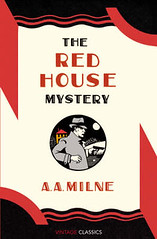Sometimes it is rather annoying to read a detective story which your friends haven't read. I mean of course when you think you have been terribly clever and worked it all out before the detective has. Because you cannot tell anyone what you think the solution is in case it is the right one. This is doubly true if you have had another theory earlier, which you have now had to abandon or revise. Any attempt at sharing your genius with the world at large must be so vague as to be completely useless as a corroboration when you close the book and say "hah! I was right!".
This is my main objection to A.A. Milne's (no, not
Winnie the Pooh)
The Red House Mystery. It is excellent. I find it a little shocking that nobody took the time to introduce me to it earlier (perhaps there is a reason why my edition of it is labelled "A rediscovered classic". Someone clearly forgot about it).
It does the formal detective story ("whodunnit") very well. Better, perhaps than any other formal detective story I have come across. Which may be why I got there before the detective did: contrary to popular belief, most formal detective stories don't really give you all that you need to know before the dénouement; they merely provide the illusion that they do. Usually, the coherence of the plot is a retroactive affair in which the reader looks back over what he (or, indeed, in these modern times, she) has read, compares it with the ending, and realises that there were clues to that (oh, dear, the butler did it) effect the whole time. It does not follow from this that one could have taken these clues and built the solution.
But in Milne's book the logic of the detective is constantly held up to scrutiny. A provisional explanation of events are given which sounds plausible enough (if a little boring), but is then undermined by new information that forces a revision. This happens a lot, but the core of the resolution is given very early on in true detective fiction style.
I enjoyed the detective character and his Watson, immensely. They are well aware of the tradition they are working within and frequently refer to Conan Doyle's characters as models to be interacted with or measured against. Even their conversation frequently ironically mimics that of Holmes/Watson. From this we can deduce that this is not a book which takes itself too seriously, and this increases the charm of it as far as I am concerned.
A.A. Milne, in his introduction to it, writes about his demands for a detective novel that,
It should be written in English. ... It is, to me, a distressing thought that in nine-tenths of the detective stories of the world murderers are continually effecting egresses when they might just as easily go out. The sleuth, the hero and the many suspected all use this same strange tongue, and we may be forgiven for feeling that neither the natural excitement of killing the right man, nor the strain of suspecting the wrong one, is sufficient excuse for so steady a flow of bad language.Indeed.
Well, Milne writes English. I hardly noticed I was reading it. It translated very seamlessly into a film in my imagination. There were occasional excellent wordings that I remarked on, but there were no egresses that I could find. Of course, the excellent wordings and the witty phrase could be said to be as much part of writing in English as keeping to plain language is. There is a style to it which made me want to drink gin & tonic and ideally sit in a park. In that respect it reminds me of Wodehouse, but that could give you entirely the wrong impression. Or the right one. One never knows.
My one problem with the book was that it seemed obsessed, at times, with the size of rooms and their relation to one another. It may be that this seemed unnecessary to me because I have never been the type to sit down and actually try to work out the solution (except through brilliant intuitive flashes, of course). I dare say someone who did would find it useful.
All in all, I recommend it. It was thoroughly enjoying and it made me feel smart.


Comments